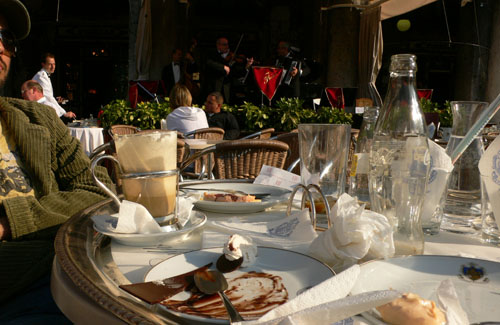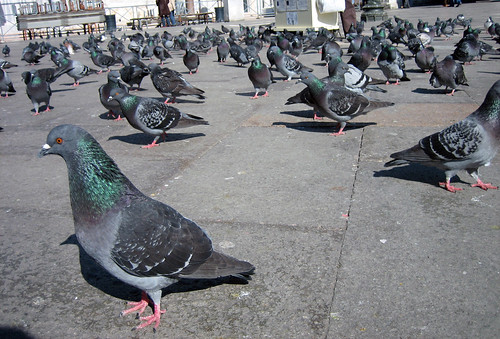From Volume I, Chapter IV, "St Mark's". I have a lot to comment on/insert from this chapter.
He compares the sculptures on the arches and porches to the effect which the earliest light made among the branches of Eden. This ecstatic sort of writing reminds me of a kind of attitude I used to pick up from certain people at my college when contemplating a certain representation of ideas that especially pleased them. I am not going to claim that it happened all the time but it happened enough to be in the general atmosphere, and it was something very satisfying to encounter.
"Between that grim (generic) cathedral of England and this, what an interval! There is a type of it in the very birds that haunt them; for, instead of the restless crowd, hoarse-voiced and sable-winged, drifting on the bleak upper air, the St. Mark's porches are full of doves, that nestle among the marble foliage, and mingle the soft iridescence of their living plumes, changing at every motion, with the tints, hardly less lovely, that have stood unchanged for seven hundred years." This contrast obviously no longer holds.
 "And what effect has this splendour on those who pass beneath it? You may walk from sunrise to sunset, to and fro, before the gateway of St. Mark's, and you will not see an eye lifted to it, nor a countenance brightened by it." Half the greatness of Ruskin, or any writer, I think more and more, lies in their capacity to be absolutely certain they are the only person currently living who is able to see anything for what it really is, which therefore renders them and their work necessary; (obivously many disturbed and delusional people feel this same way, and to be honest I do not think there is much of a difference between the two cases, only that the successful writer's intellect is more forceful and his vision more persuasive).
"And what effect has this splendour on those who pass beneath it? You may walk from sunrise to sunset, to and fro, before the gateway of St. Mark's, and you will not see an eye lifted to it, nor a countenance brightened by it." Half the greatness of Ruskin, or any writer, I think more and more, lies in their capacity to be absolutely certain they are the only person currently living who is able to see anything for what it really is, which therefore renders them and their work necessary; (obivously many disturbed and delusional people feel this same way, and to be honest I do not think there is much of a difference between the two cases, only that the successful writer's intellect is more forceful and his vision more persuasive).Ruskin did not dig the cafe scene that had sprung up in the square all around the cathedral, and which the tourists are still loving unto the present day, either:
"...there is almost a continuous line of cafes, where the idle Venetians of the middle classes lounge, and read empty journals; in its (the square's) centre the Austrian bands play during the time of vespers, their martial music jarring with the organ notes..."
"Yes, verily: to be baptized with fire, or to be cast therein; it is the choice set before all men...Venice has made her choice." Needless to say, she did not choose wisely. The section in which this is discussed, about the serenity and religious seriousness evident in the least details of tombs, brickwork, mosaics and so forth in the old part of the cathedral, is well done.
 Incrustation is a pretty word. It is used a lot in this book. I believe the sense in which he uses it refers to primary building materials (brick, tufa) being supplemented by different, often more ornamental ones (marble). It is a prominent feature of many old buildings in Italy.
Incrustation is a pretty word. It is used a lot in this book. I believe the sense in which he uses it refers to primary building materials (brick, tufa) being supplemented by different, often more ornamental ones (marble). It is a prominent feature of many old buildings in Italy.
"...he has no more right to complain of treachery than a savage would have, who, for the first time in his life seeing a man in armour, had supposed him to be made of solid steel." Is this a reference to the famous pubic hair incident?
"The perception of colour is a gift just as definitely granted to one person, and denied to another, as an ear for music; and the very first requisite for true judgement of St. Mark's, is the perfection of that colour-faculty which few people ever set themselves seriously to find out whether they possess or not." Something tells me that I lack this talent to a pretty unsalvageable degree.
"If, therefore, the reader does not care for colour, I must protest against his endeavor to form any judgement whatever of this church of St. Mark's." O.K. "But if he both cares for and loves it, let him remember that the school of incrusted architecture is the only one in which perfect and permanent chromatic decoration is possible..." I thought this was important to make a note of because I never think of things in this way. I could not have come up with the basic premises of these last two sentences on my own.



No comments:
Post a Comment